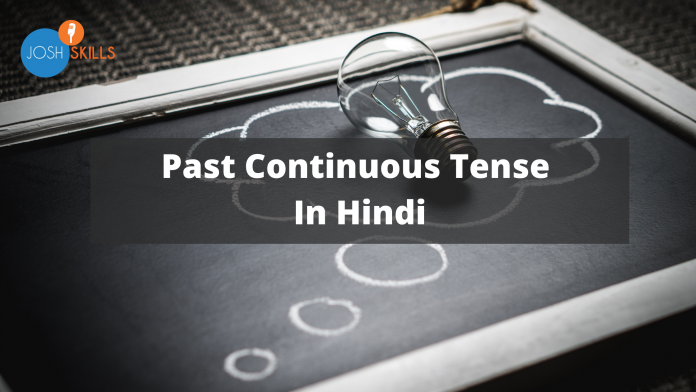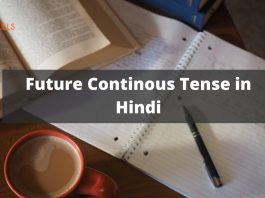
Is article mai hum aapko Past Continuous Tense ki Definition, Formation, Usage aur Structure ke baare mai detail mai batayenge examples ke saath. Toh aaiye jante hai Past Continuous Tense in Hindi.
English language mai Tenses bahut important role play karte hai. Aap bhi Josh Skills mai diye gaye English Grammar par based articles jaise ke Verbs in Hindi, Noun in Hindi, Adjectives in Hindi, Present Perfect Tense in Hindi, Present IndefiniteTense in Hindi ko padh kar apni Grammar ko improve kar sakte hai, saath hi mai agar aap Josh Talks par diye gaye important courses ki help lenge to phir aap ki English bahut hi improve ho jayegi. Chaliye aage badhte hai aur jaante hai Past Progressive Tense ke baare mai.
Definition Of Past Continuous Tense In Hindi
Past Continuous Tense ko Past Progressive Tense bhi kaha jata hai aur Hindi mai ise kehte hai Apoorn Bhootakaal. Past Continuous Tense wo Verb Tense hai jo describe karta hai ek continuing past action ko kisi specific time par. Past Progressive Tense koi ongoing kaam yani ke wo kaam jo abhi chal raha hai aur wo action jo past mai complete nahi hua hai kisi particular moment par, inko darshata hai.
Josh Skills App par Sikhe Fluent English Bolna
Past Continuous Tense in Hindi konsi situations ya actions ko describe karne ke liye use hota hai?
- Hum Affirmative Sentences ka use neeche diye gaye points ko confirm karne ke liye karte hai.
- Negative Sentences ka use neeche diye gaye points ko deny karne ke liye karte hai.
- Interrogative form of sentences ka use hum question puchne ke liye karte hai.
Aaiye aage badhte hai aur dekhte hai usage of Past Continuous Tense in Hindi
Usage 1 – Continuous actions at a definite time
Hum Past Continuous Tense use karte hai un continuous actions ko darshane ke liye jo past mai ek definite time par hue hai.
Example:
- Last night at 9 p.m., I was listening to music; Pichli raat 9 p.m ko mai music sun raha tha.
- We were talking about the new year at this time yesterday; Kal hum isi time par new year ke baare mai baat kar rahe they.
- I was sleeping at 11 p.m. last night; Pichli raat mai 11 p.m. ko so raha tha.
Usage 2 – Longer actions with interruption
Hum Past Progressive ka use karte hai jab hum past mai hue kisi lambe action ke baare mai baat karte hai aur wo action kisi aur action ki wajah se interrupt hua ho.
Example
- While he was playing football, he broke his leg; Jab wo football khel raha tha, uska paao toot gaya.
- While Sweety was having rest, she heard a strange noise; Jab Sweety rest le rahi thi, usne ek ajeeb si awaz suni.
- I fell down while I was riding on my bike; Mai neeche gir gaya jab mai bike chala raha tha.
- She closed her eyes while the man was standing on the rope. Usne apni aankhe band karli jab usne aadmi ko rope par khade dekha.
Note:
“While” usually Past Continuous Tense ke saath use hota hai.
“When” usually Simple Past Tense ke saath use hota hai.
Usage 3 – Parallel actions in the past
Hum Past Continuous Tense ka use kar sakte hai jab do cations ek saath ho rahe ho aur wo dono actions ek dusre ko interrupt nahi kar rahe ho. In actions ko past mai hue parallel actions kaha jata hai.
- While I was waiting for her, she was sleeping on her bed; Jab mai us ke liye wait kar raha tha, wo apne bed par so rahi thi.
- While it was raining, we were playing football in the garden; Jab barish ho rahi thi, hum garden mai football khel rahe they.
- Alice wasn’t studying maths while her mother was cooking; Alice maths nahi padh rahi thi jab uski maa khana bana rahi thi.
- She was cleaning the house while the men were working outside; Wo ghar ki safai kar rahi thi jab wo aadmi baher kaam kar rahe they.
- What were you doing while I was having a shower?; Tum kya kar rahe they jab mai shower le raha tha?
Usage 4- Describing the atmosphere (environment)
Hum use kar sakte hai series of Past Continuous Tenses jab hum past mai kisi specific time par people aur environment (atmosphere) ke baare mai baat karte hai.
Example:
- The sun was shining and the birds were singing. Everybody was happy in the park; Suraj chamak raha tha aur birds gaa rahe they. Sabhi park mai khush they.
- The children were playing games and their parents were sitting under the trees; Bacche games khel rahe they aur unke parents ped ke neeche baithe they.
Note:
Dhyan rakhe, hum Non Progressive Verbs ko Past Continuous Tense ke saath use nahi kar sakte.
Recognition, Formation And Examples Of Past Continuous Tense In Hindi
Past Continuous Tense three types of sentences mai use kiye jaate hai. Aaiye dekhte hai wo kya hai.
- Past Continuous Affirmative
- Past Continuous Negative
- Past Continuous Interrogative
Aaiye aage badhte hai aur dekhte hai ye kya hai aur ye kaise form hote hai aur sentence mai kaise use kiye jate hai.
1. Past Continuous Tense in Hindi; Affirmative Sentence – Formation Aur Examples
Jab hum kisi sentence ko Affirmative form mai express karte hai, Verb ye confirm karta hai ki past period form mai kuch action ho raha tha.
Formation and Recognition Of Affirmative Form In Past Continuous Tense In Hindi
Past Continuous ke Affirmative form ka structure dekhte hai.
Subject + was / were + [verb + -ing] + …
Was / were: Verb ke past simple “to be” ke form hai
Example:
- I was working
- You were working
- He / She / It was working
- We / You / They were working
Example Sentences
- Longer background action jo interrupt hota hai shorter one se.
- I was running in the park when you sent me that message; Mai park mai bhaag raha tha jab tumne mujhe wo message bheja.
- She was practising sports when I called her; Jab maine usey bulaya wo sports practice kar rahi thi.
- They were watching TV when she got back from work; Wo log TV dekh rahe they jab wo kaam se wapas aayi.
- Event jo occur hota hai past mai kisi exact time par.
- It was 9 o’ clock when I was running in the park; 9 baj rahe they jab mai park mai bhaag raha tha.
- I called her at 11:45 am and she was practising sports; Maine use 11:45 am ko call kiya tha aur wo sports practice kar rahi thi.
- She returned from work at 7 o’ clock and they were still watching TV; Wo 7 o’ clock ko kaam se wapas aayi aur wo log tab bhi TV dekh rahe they.
- Uninterrupted action jo progress mai they kuch time ke liye
- I was running; Mai bhaag raha tha
- He was crossing the road; Wo road cross kar raha tha
- We were watching TV during our break; Hum TV dekh rahe they break mai.
- Past mai hue period of time ki length
- I was working in the bakery last summer; Mai bakery mai kaam kar raha tha last summer mai.
- She was practising sports every day last year; Wo sports practice kar rahi thi har din last year.
- They were watching TV all day when they were young; Wo log saara din TV dekha karte they jab wo chote they.
- Past mai hue simultaneous actions
- I was running while she was walking; Mai bhaag raha tha jab wo chal rahi thi.
- She was practising sports while her mother was cooking; Wo sports practice kar rahi thi jab uski maa khana bana rahi thi.
- We were talking while the kids were watching TV; Wo log baat kar rahe they jab bacche TV dekh rahe they.
- Sequence of actions jo past mai hue ho.
- I went to the park, the kids were playing on the grass, their parents were sitting on the fence and some teenagers were running; Mai park gaya tha, bacche ghaas par khel rahe they, unke parents fence par baithe they aur kuch teenagers bhaag rahe they.
- She went home and her mother was working on the laptop, her father was watching tv and her sister was studying; Wo ghar gayi aur uski maa laptop par kaam kar rahi thi, uske father TV dekh rahe they aur uski sister padhai kar rahi thi.
- We went to the doctor today and while waiting, some patients were reading magazines, some were talking on the phone and the secretary was typing on the computer; Hum aaj doctor ke paas gaye they aur jab hum wait kar rahe they, kuch patients magazines padh rahe they, kuch phone par baat kar rahe they aur secretary computer par typing kar rahi thi.
- Repeated ya annoying action (with always)
- I was always going to class late; Mai hamesha class ko late jaya karti thi.
- She was always doing sports every day for years to become a good athlete; Wo hamesha sports karti thi har din, kayi saal tak ek acchi athlete banne ke liye.
- They were always watching TV on high volume late at night; Wo log hamesha high volume par TV dekhte hai late night tak .
2. Past Continuous Tense in Hindi; Negative Sentence – Formation And Examples
Jab hum Past Continuous Tense negative form mai use karte hai to Verb jo bhi action mai ho raha tha usko deny karta hai.
Formation and Recognition of Negative Form In Past Continuous Tense In Hindi
Aaiye dekhte hai Past Continuous Tense ka structure.
Subject + was / were + not + [verb + -ing] + …
Was / were: Verb ke past simple “to be” ke form hai
Example:
- I was not working
- You were not working
- He / She / It was not working
- We / You / They were not working
Negative Form ka short form Past Simple ke short form ki tarah hi hota hai. Jaise ke:
I wasn’t, You weren’t, he wasn’t etc.
Example Sentences
- Longer background action jo interrupt hua hai shorter one se
- I wasn’t running in the park when you sent me that message; Mai park mai nahi bhaag raha tha jab tumne mujhe message bheja.
- She wasn’t practising sports when I called her; Wo sports practice nahi kar rahi thi jab maine usey bulaya.
- They weren’t watching TV when she got back from work; Wo log TV nahi dekh rahe they jab wo kaam se lauti.
- Wo event jo occur hue hai past mai kisi exact time par
- I wasn’t running in the park at 9 o’clock; Mai park mai nahi bhaag raha tha 9 o’clock ko.
- She wasn’t practising sports when I called her at 11:45 am; Wo sports practice nahi kar rahi thi jab maine usey 11:45 am ko call kiya.
- They weren’t watching TV when she returned from work at 7 o’ clock; Wo log TV nahi dekh rahe jab wo kaam se 7 o’clock ko lauti.
- Uninterrupted action jo progress mai they kuch duration ke liye
- I wasn’t running; Mai nahi bhaag rahi thi.
- He wasn’t crossing the road; Wo road nahi cross kar raha tha.
- We weren’t watching TV during our break; Hum break mai TV nahi dekh rahe they.
- Past mai hue period of time ki length
- I wasn’t working in the bakery last summer; Mai bakery mai kaam nahi kar raha tha, last summer mai.
- She wasn’t practising sports every day last year; Wo har din sports practice nahi kar rahi thi, last year.
- They weren’t watching TV all day when they were young; Wo TV nahi dekh rahe they saara din jab wo chote they.
- Past actions jo simultaneously hue ho
- I wasn’t running while she was walking; Mai nahi bhaag raha tha jab wo chal rahi thi.
- She wasn’t practising sports while her mother was cooking; Wo sports practice nahi kar rahi thi jab uski maa khana bana rahi thi.
- We weren’t talking while the kids were watching TV; Hum baat nahi kar rahe they jab bacche TV dekh rahe they.
- Sequence of actions jo past mai occur hue ho.
- I went to the park, the kids weren’t playing on the grass, their parents weren’t sitting on the fence and teenagers weren’t running; Mai park gaya tha, bacche wahan ghaas mai nahi khel rahe they, unke parents fence par nahi baithe they aur teenagers nahi bhag rahe they.
- She went home and her mother wasn’t working on the laptop, her father wasn’t watching TV and her sister wasn’t studying; Wo ghar gayi aur uski maa laptop par kaam nahi kar rahi thi, uske father TV nahi dekh rahe they aur uski sister padhai nahi kar rahi thi.
- We went to the doctor today and while we were waiting at the doctor the other patients weren’t reading magazines, others weren’t talking on the phone and the secretary wasn’t typing anything on the computer; Hum aaj doctor ke paas gaye they aur jab hum wait kar rahe they doctor ke paas to dusre patients magazines nahi padh rahe they, dusre log phone par baat nahi kar rahe they aur secretary computer par typing nahi kar rahi thi.
- Repeated ya annoying action (with always)
- I wasn’t always going late to the class; Mai class ko hamesha late nahi ja raha tha.
- She wasn’t always doing sports everyday for years to become a good athlete; Usne hamesha sports nahi kiya hai har din kayi saal tak ek acchi athlete banne ke liye.
- They weren’t always watching TV on high volume late at night; Wo log hamesha high volume par TV nahi dekhte hai late night ko.
3. Past Continuous Tense In Hindi; Interrogative Sentence – Formation Aur Examples
Hum Past Continuous Tense in Hindi mai Interrogative form kisi cheez ya situation ke baare mai questions poochne ke liye use karte hai jo past mai kisi time par hua ho.
Formation and Recognition of Interrogative Form In Past Continuous Tense In Hindi
The past continuous ke Interrogative form ka structure dekhte hai.
Was / Were + subject + [verb + -ing] + …?
Was / were: Verb ke past simple “to be” ke form hai
Examples
- Was I working?
- Were you working?
- Was he / she / it working?
- Were we / you/ they working?
Example sentences
- Longer background action interrupted by a shorter one
- Was I running in the park when you sent me that message?; Kya mai park mai bhaag raha tha jab tum ne mujhe message bheja?
- Was she practising sports when I called her?; Kya wo sports practice kar rahi thi jab maine use bulaya?
- Were they watching TV when she got back from work?; Kya woh TV dekh rahe they jab wo kaam se lauti?
- Event occurring at an exact time in the past
- Was I running in the park at 9 o’clock?; Kya mai park mai bhaag raha tha 9 o’clock ko?
- Was she practising sports when I called her at 11:45 pm?; Kya wo sports practice kar rahi thi jab mai ne use call kiya 11:45 pm ko?
- Were they still watching TV when she returned from work at 7 o’clock?; Kya wo tab bhi TV dekh rahe they jab wo kaam se lauti 7 o’clock ko?
- Uninterrupted action jo progress mai they kuch time ke liye
- Was I running?; Kya mai bhaag rahi thi?
- Was he crossing the road?; Kya wo road cross kar raha tha?
- Were we watching TV during our break?; Kya hum TV dekh rahe they hamare break mai?
- Past mai period of time ki length
- Was I working in the bakery on the opposite road last summer?; Kya mai bakery mai kaam kar raha tha opposite road par, last summer?
- Was she practising sports every day last year to prepare for the race?; Kya wo sports practice kar rahi thi har din last year, race ke liye prepare hone ke liye?
- Were they watching TV all day when they were teenagers?; Kya woh TV dekh rahe they saara din jab wo teenagers they?
- Past mai hue simultaneous actions
- Was I running while she was walking?; Kya mai bhaag raha tha jab woh chal rahi thi?
- Was she practising sports while her mother was cooking?; Kya woh sports practice kar rahi thi jab uski maa cooking kar rahi thi?
- Were we talking while the kids were watching TV?; Kya hum baat kar rahe they jab bacche TV dekh rahe they?
- Sequence of actions jo past mai occur hue ho
- Were the kids playing on the grass, their parents sitting on the fence and teenagers running when you went to the park?; Kya bacche ghaas par khel rahe they, unke parents fence par baithe they aur teenagers park mai bhaag rahe they, jab tum park mai gaye they?
- Was her mother working on the laptop, her father watching TV and her sister studying when she went home?; Kya uski maa laptop par kaam kar rahi thi, uske father TV dekh rahe they aur uski behen padhai kar rahi thi jab wo ghar gayi?
- Were the patients reading magazines, others were talking on the phone and was the secretary typing anything on the computer while you were waiting at the doctor today?; Kya patients magazines padh rahe they, dusre phone par baat kar rahe they aur kya secretary kuch typing kar rahi thi computer par jab tum aaj doctor ke paas wait kar rahe they?
- Repeated or annoying action (with always)
- Was I always going late to class?; Kya mai hamesha class ko late jata hu?
- Was she always doing sports for years to become a good athlete?; Kya wo hamesha sports practice karti thi saalo tak ek acchi athlete banne ke liye?
- Were they always watching TV on high volume late at night?; Kya wo hamesha TV dekhte hai high volume par late night?
Exercises/Worksheet/Activities of Past Continuous Tense in Hindi
Make sentences in the Past Continuous Tense In Hindi And English
1. They ……………….. (walk) towards the market.
2. Raju ………………. (play) with his dogs.
3. Uncle …………….. (repair) his radio.
4. Suma …………….. (wait) for the bus.
5. The dogs ……………. (chase) the cat.
6. I ……………… (get) anxious.
7. It ………………… (go) to rain.
8. I ……………….. (sleep) when the lights went out.
9. You ……………… (work) in Mumbai at that time.
10. The child …………….. (cry) because she was scared.
11. The spider …………… (weave) his web.
12. The girls ……………….. (practice) the piano.
13. The carpenter ……………… (make) a table.
14. The wind ……………….. (blow) fiercely.
15. The fire …………….. (burn) brightly.
Answers
1. They were walking towards the market.
2. Raju was playing with his dogs.
3. Uncle was repairing his radio.
4. Suma was waiting for the bus.
5. The dogs were chasing the cat.
6. I was getting anxious.
7. It was going to rain.
8. I was sleeping when the lights went out.
9. You were working in Mumbai at that time.
10. The child was crying because she was scared.
11. The spider was weaving his web.
12. The girls were practicing the piano.
13. The carpenter was making a table.
14. The wind was blowing fiercely.
15. The fire was burning brightly.
Is quiz mai Past Progressive Tense in Hindi se related 10 questions diye gaye hai aur har question ka correct answer bataiye. Neeche diye gaye answers se aap apna progress check kar sakte hai.
1. Yesterday, at six I ___________ dinner.
- was preparing
- was prepare
- was prepared
- did prepare
2. My father __________ a novel while I _______ TV.
- was read / was watching
- were reading / was watching
- read / watched
- was reading / was watching
3. We ___________ our school when he came in.
- talked
- were talking
- were talked
- talking
4. The kids _____________ in the garden when it suddenly started to rain.
- played
- playing
- were playing
- was playing
5. Most of the time we __________ in the park.
- were sat
- sitting
- was sitting
- were sitting
6. While I ____________ in my room, my sister left home.
- was studying
- studied
- study
- have studied
7. My baby brother ______________ loudly so I couldn’t do my homework.
- was cried
- cried
- was crying
- has cried
8. The teacher tried to explain but they __________.
- were listening
- weren’t listening
- listened
- have listened
9. _______ you doing your homework at six o’clock last night?
- Are
- Did
- Have
- Were
10. The teacher was angry because some students ___________ football in the class when he came in.
- are playing
- played
- have played
- were playing
Answers
- was preparing
- was reading / was watching
- were talking
- were playing
- were sitting
- was studying
- was crying
- weren’t listening
- were
- were playing
Ab aap jaan gaye hai ki Past ContinuousTense in Hindi kya hai, iska definition kya hai, iska usage, examples aur formation kaise kiya jata hai. Ab hum aapko batate hai ke ghar baithe aap apni English ko kis tarah improve kar sakte hai.
Ghar baithe English grammar kaise sikhe aur practice kare?
Agar aap ek beginner hai toh aapko basic English grammar ki practice karni padegi tabhi aap ismai perfect ho sakte hai.
Ab aap sonch rahe honge ke aap apni English grammar improve karne ke liye kaise practice kare. Toh mai aapko basic English grammar practice karne ke kuch techniques bataati hu.
Aap ko Josh Skills App par kayi saare articles bhi milenge jaise ke Noun in Hindi, Verb in Hindi, Present Indefinite Tense, Prepositions kya hoti hai.
English grammar kaise sikhe – Practice books
Basic English grammar ko practice karne ke liye bahut saare books available hai jisse beginners ki help hojaati hai. In books mai English grammar ki detailed information di jaati hai jisse aap asaani se ghar baithe apni grammar improve kar sakte hai. Aise hi kuch books hai-
The Elements of Style Workbook
Basic Grammar in Use Student’s Book with Answers
Practice Makes Perfect Basic English, Second Edition
Join Josh Skills Spoken English Course
Judiye 20,000+ logo ko jo Josh ke saath English bolna aur padhna seekh rahe hai. Iss Spoken English Course ko aise design kiya gaya hai, ki koi bhi basic learner iss course se apne theoretical and practical grammar ko improve kar sakta hai. Everyday situations mei english ko kaise most effectively use kiya jaa sakta hai – iss par bhi extra dhyaan diya jaata hai.

Toh aaj hi shuru kare apni learning journey Josh Skills ke courses ke sath.



